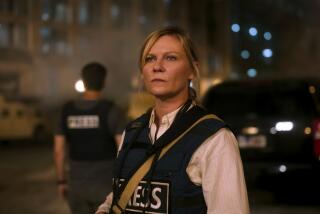Stepping into the shoes of soldiers
- Share via
Jamie Draven recognized that he was facing a thorny proposition when he agreed to star in “Badland.” Early in the drama, his character, a traumatized Iraq war veteran, dispatches three members of his family in a monstrous act and goes on the lam.
As murderous film figures go, Marine reservist Jerry Rice doesn’t fall into the usual categories of gangster flash or deep eccentricity. He’s something far more complex -- a working-class father of three, a man grappling with the ghosts of war.
“The act that he commits couldn’t be any harsher. I knew it was going to be hard to recover from that for people watching it,” Draven said. “But ultimately I felt I had a responsibility to these soldiers.”
The British actor was referring to that particular group of walking wounded whose bodies may be whole but who struggle with psychological damage. In the case of Draven’s pushed-to-the-brink character in “Badland,” rural poverty and a hellish marriage don’t ease his transition back into civilian life.
Without sentimentalizing the protagonist or pleading his case, writer-director Francesco Lucente’s film, which opens in limited release today, offers glimpses of hope, if not redemption, during the ill-fated travels of Jerry and his young daughter.
Playing his first American character, Draven, 28, creates an essentially decent man whose bottled-up pain explodes in devastating rage. The role represents a different kind of career breakthrough for the lifelong movie fan, who made a name for himself in the 1999 crime drama miniseries “Butterfly Collectors,” starring opposite Pete Postlethwaite, and one year later connected with international audiences as Tony in “Billy Elliot.” It was his onscreen ferocity in “Billy Elliot” -- as the title character’s striking-miner brother -- that made an impression on Lucente, who sent Draven his script and then met with him in London.
“I really responded to it,” Draven said of the screenplay over a beer on the terrace of the Chateau Marmont. “I think a lot of people’s eyes are closed to the subject. I wasn’t aware of it to the extent I am now.” He hopes that “Badland” increases awareness of war’s invisible casualties and the ways cultural stigmas can make vets reluctant to seek help. “If it makes people angry, then even better.”
To prepare for the role, Draven read books on the subject and watched a number of documentaries, citing a 2005 “Frontline” piece, “The Soldier’s Heart,” as especially enlightening. The research gave him new insight on the behavior of combat vets he’d known, and he drew upon those memories in shaping his character. “Their eyes do sort of glaze over when they’re thinking back, and that’s no cliche and no small thing.”
Having forgone formal training, Draven -- who moved from Wythenshawe, a council estate in Manchester, England, to London to work at age 18 -- approaches each role with an instinct for exploration rather than an actorly philosophy or Method. The DIY ethos of the “Badland” shoot, with its long days of concentrated work, helped to fuel his intuitive naturalness.
“I was knackered, absolutely knackered,” Draven said. “You just keep going, and I think it really helps because the momentum’s there. It helps to keep your character going.”
It helped too that the low-budget production was operating with a skeleton crew. Draven found it “staggering” at first that Lucente and cinematographer Carlo Varini also served as drivers. But he came to appreciate the leanness of the enterprise and found it refreshing not to have costume and makeup people “fussing at you all the time.”
The experience was such an inspiring one for Draven that he’s in talks with Lucente for another feature; they’re sorting out a number of ideas that the director promises are “more intense” than “Badland.”
Sensing a certain degree of typecasting in the U.K. based on his television work, Draven welcomes the chance to move further outside his comfort zone. “I’m trying to do as many different things as possible and not feel like I’m acting when I’m doing it.”
More to Read
Only good movies
Get the Indie Focus newsletter, Mark Olsen's weekly guide to the world of cinema.
You may occasionally receive promotional content from the Los Angeles Times.










